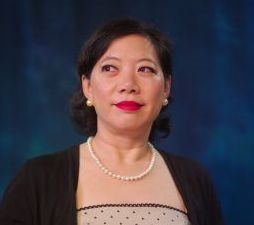LDI News
Don't Hesitate to look for Diverse Mentoring

LIWP Leader Spotlight
Michi Fu, PhD
California School of Professional Psychology, Alliant International University
What was your biggest takeaway from LIWP?
The biggest thing is that there are different leadership styles and different leadership methods for various stages of one’s career. And that, even though I did not have a lot of role models in my own life, there are a lot of folks that are willing to extend themselves to give me information. So, opening myself up to being mentored by different folks, and by peer mentors as well, can actually be much more helpful than trying to work within one’s own system and trying to find the answers within one’s own university, because that may not get you as far as this network of other women who’ve already gone through the steps.
How did you apply your LIWP learning to your life and career?
Well, I managed to apply for a promotion and I managed to successfully apply for sabbatical as well, and it completely changed my life. Because of that, I now can consider myself an international psychologist because I’ve spent a year at another university [in Taiwan] teaching in another language. Before that, I dabbled and did one workshop, but that didn’t count as anything. I couldn’t just jump over to a relaxation getaway and say I’m an international psychologist now. But after spending a year taking Mandarin lessons and working through interpreters, I can now be in another setting and still use psychology to help other populations. It really did transform my personal life because it enabled me to have a whole new life I didn’t think of. Because of sabbatical I applied for citizenship in another country and got it, and I was able to start an improv group and a bunch of other things. But it was really because LIWP encouraged me to apply for promotion, even though no one in the past had tapped me on the shoulder and said, “You should apply for sabbatical because that’s one of the perks of being on faculty.” Because other people gave me the permission, I thought it was something I should look into.
Do you still do you still go back and visit Taiwan?
I do. I chose Taiwan because I could have sabbatical anywhere in the world. At home, I could have just been writing my book. But I chose Taiwan because my mother retired there and it actually worked out very well because before the pandemic hit, I would think, “Well, I already have a U.S. citizenship, why should I bother to apply?” But having the Taiwanese citizenship has been the only way I can travel now.
Maybe LIWP did not give me all these things, but had they not pushed me, I would have quit academia. I was very discouraged by our administration, which was making a lot of decisions that made it more difficult to justify being there. They went from being a nonprofit to a benefits court. So, I started an exit plan and when LIWP came into my life, I was in the middle of a lot of career transitions. I thought, “Why the heck not? All these mentors are telling me you need to go explore, be unapologetic.” I carved out my plan and decided to take the sabbatical and if I came back to my administration and it remained the same, I would leave. The encouragement made me feel like I had options.
What’s the best advice you’ve ever received?
I was a student and the president of the Asian American Psychological Association was female. I was a student board member, so I think it was in my early or maybe mid-20s and basically I knew nothing. Therefore, anytime someone asked if anyone wanted to work on a project, I would say yes. And Gayle Iwamasa, who would later on be in LIWP cohort seven with me and at the time was president, taught me an important lesson. I distinctly remember when I jumped in to volunteer for something and she interjected and said, “Absolutely not.” She said, “We need to protect this woman because she’s still a student: She doesn’t know how to say no yet.”
She taught me how to protect my time. One of the best pieces of advice that I’ve ever received happens to have been from an LIWP sister, but it was really to learn how to say no, and to be very discriminatory about how we spend our energy.
What advice would you give to other women who are midcareer leaders in psychology?
I suppose a plug that I can genuinely give is, join LIWP. Maybe for some it’s not feasible due to childcare, finances, and what-have-you, so don’t hesitate to look for mentoring and diverse mentoring too: Don’t put all your eggs in one basket. But if you can attend LIWP, it is the most efficient way of trying to get your career to move in another direction. There are other leadership or mentoring kinds of programs that I also have been involved in that have done a lot for my career too. For example, current APA president, Dr. Jennifer Kelly, ran one for the diversity delegates. If you can’t join LIWP, diversity of delegates was funded my year so that makes a difference for some folks. I know for early career psychologists there’s a Leadership Development Institute from the Council of National Psychology Associations for the Advancement of Ethnic Minority Interests. There are all these other pathways but if you’re looking specifically for intersectionality of gender plus another identity, LIWP is a really great pathway.
What can you share with your LIWP alumna sisters about what you learned about yourself as a leader in the process?
I had an answer here and it is still true: Embrace different leadership styles and know when to use them for different settings. That’s been tremendous. Another one is having an elevator speech and knowing when to customize that elevator speech for the various contexts that we kind of flow in and out of. This was especially important because during the evening reception on day one, I remember them saying, “Everybody gets one minute.” They were not kidding around: They literally yanked the microphone out of someone’s hand. And that is how it is in the real world. So, being able to distill a very brief bio and deliver to various audiences was a skill that I didn’t realize would serve me so well in various contexts.
Okay, so those are the two on paper, and it’s also helpful, I think, to have an attitude of humility. Being a leader who’s curious and willing to learn has been very helpful to me. In the past, I felt like there’s no room to not know, you just had to do it; now I realize you can give yourself some grace and you can say out loud that you’re just as scared and clueless as everyone else. Maybe I have the project management skills, I just don’t have the actual content skills to drive a project. I realized being humble means being curious, as well as being able to ask for help. So, being able to collaborate with others that complement our styles seems to be a better way to operate as a leader.
From LeadHERship, Vol. 5 (2021)
